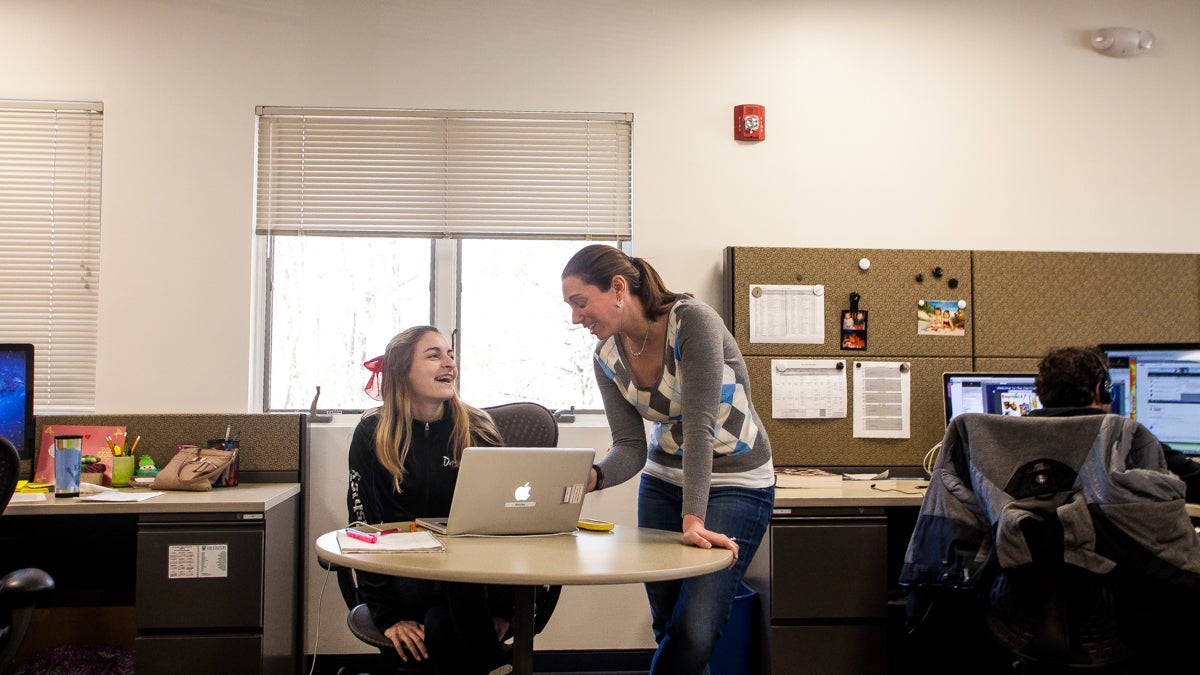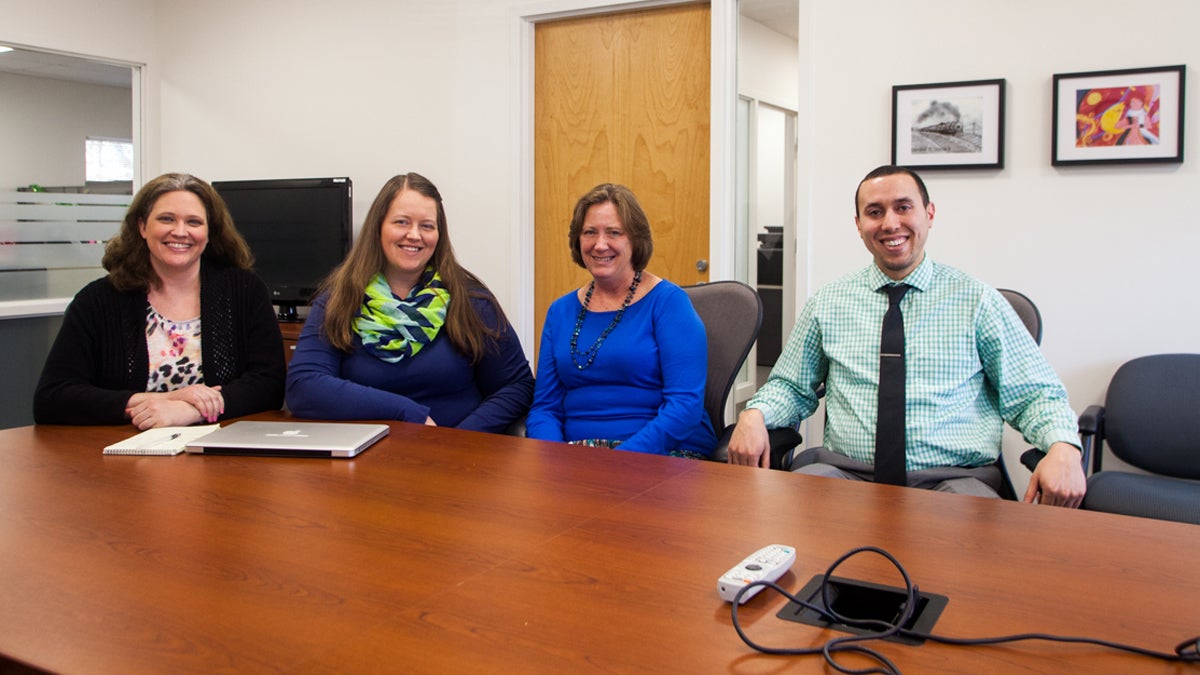Pa. cyber charters not happy with Gov. Wolf’s proposed steep cuts
Listen
Eighth grader Ashley Mango works on math with her teacher Thrisha Miller. Mango goes into 21st Century Cyber Charter about once a week for in-person help. She said she likes the perks of doing school work at home in her pajamas. (Brad Larrison/for NewsWorks)
For years, many public education advocates have been howling about the way Pennsylvania funds cyber charter schools.
Eleventh in an occasional series of podcasts and web “explainers.” To listen to the podcast, click the audio player above.
For years, many public education advocates have been howling about the way Pennsylvania funds cyber charter schools.
It works like this: Say there’s a cyber charter with a physical headquarters in Altoona. It can enroll kids from anywhere in the state, and it gets a percentage of whatever per pupil funding would have been spent in a student’s home district.
If a student comes from a wealthy district in the Philadelphia suburbs, the cyber charter will get upwards of $20,000. If a student comes from a poor urban or rural district, the cyber will get much less.
“Why should a cyber charter get $25,000 for one student and $13,000 for another when the school is doing the same thing for those two students?” said Susan Dejarnatt, a Temple University law professor who focuses on inequities in public education.
Dejarnatt says it’s mind-boggling that the state’s cyber law — passed when Republican Mark Schweiker was governor — calls for cyber charters to be funded in the same way as brick-and-mortar charters.
“As a common-sense matter, bricks-and-mortar charter schools are more expensive to run because they have buildings, people to take care of the buildings and a lot more teachers,” said Dejarnatt.
The state’s new Democratic governor, Tom Wolf, agrees with that view, saying the current system ignores a vital question: How much does it actually cost to provide a cyber education?
As a fix, he proposes giving cybers a flat fee of $5,950 for each student — far less than the per-pupil spending of any traditional school district in the state.
The proposal, which is part of Wolf’s comprehensive plan to boost state education aid, would take about $160 million out of the $400 million now sent to cyber charters, and redirect it to traditional schools.
Cyber charter operators, though, say Wolf’s plan is patently unfair.
“If that budget passes, we’re going to have to either cut staff and programming, or we’re going to have to increase our enrollment,” said Kim McCully, the Interim CEO of 21st Century Cyber Charter, headquartered in Downingtown.
21st Century Cyber spends $10,736 per student. To operate with about half that figure, school officials say, would damage instructional quality. Teachers would be forced to double their caseloads — going from 160-to-200 students to 320-to-400 students.
“They’ve made all these conclusions about our school,” said McCully, “but they have never, ever reached out to us and said, can we please come look.”

Left to right: Parent Heather Saboori, director of education Kylene Ball, interim CEO Kim McCully, and marketing/recruitment specialist Lou Corominas at 21st Century Cyber Charter in Downingtown. (Brad Larrison/for NewsWorks)
Cyber charter operators question the method by which Wolf came up with his flat fee. Wolf calculated the rate based on the costs incurred by consortiums of traditional school districts (known as intermediate units) that run online programming.
The Wolf administration took the average cost of the highest performers running those programs, and added an additional 10 percent to account for extra cyber charter administrative costs.
To McCully, therein lies Wolf’s error.
“Those are not cyber schools,” she said. “Those are cyber programs.”
Standalone cyber charters need to account for a host of other expenses, says McCully — things like shipping costs, providing all students a laptop and Internet connection, and paying for all of the logistics that go into administering state standardized tests at rented facilities across the Commonwealth.
“We’re hoping that cooler heads prevail, and a closer look is taken at the actual costs of running a cyber school,” said McCully.
The Wolf administration defends comparing cyber charters to programs run by intermediate units.
“I’m certainly willing to have a conversation if they want to push back, but a 60 percent differential for all those things? I’m not sure how that works,” said Wolf in a recent interview.
A 2012 report by then Auditor General Jack Wagner (D) found the average national per pupil cyber charter rate to be $6,500.
To I.U. or not to I.U.
Not all cyber charters can be grouped under the same header.
21st Century cyber has roots in the traditional sector. It was founded by intermediate units serving Chester, Delaware, Bucks, and Montgomery counties. The school’s board is made of the four executive directors of those IUs, along with two superintendents from traditional public schools in each of those counties. The school serves 850 students in grades 6-12.
The other camp, lacking ties to traditional districts, often draws harsher criticism for its financial practices from advocates like Susan Dejarnatt.
Those cybers enroll thousands of kids, spend more taxpayer dollars on advertising, run big surpluses, and tend to contract with for-profit, sometimes out-of-state, management companies or curriculum providers.
These are Agora Cyber, Commonwealth Connections Academy, Pa. Cyber, Pa. Leadership Charter, and Pa. Virtual – all of which offer online instruction starting in kindergarten.
The founders of Agora and Pa Cyber each face federal charges for defrauding their respective schools out of millions of dollars.
The leadership of 21st Century cyber is wary of being lumped in with the bigger operators, but the two camps do share similar criticisms of Wolf’s proposal.
“No district would see a technology budget like ours,” said Maurice Flurie, CEO of Commonwealth Connections Academy, which serves more than 8,000 students. “It costs us nearly a million dollars just to administer the state assessments to our students because we have to do it in 60-some locations across the Commonwealth.”
Flurie defends Commonwealth Connections business practices.
“We contract with a for-profit company for our curriculum and our students’ learning management system,” he said. “Just like a traditional school district works with a McGraw-Hill or a Pearson to buy textbooks, we buy electronic curriculum.”
The cyber charter sector has grown significantly in recent years, with the bulk of the growth coming from boosts in the special education population.
This raises eyebrows among education advocates. Pennsylvania’s charter law provides charter schools a financial incentive to enroll a disproportionate amount of special education students with relatively mild disabilities.
Cyber operators say there’s nothing nefarious about their enrollment practices. They’re not legally allowed to screen students based on race, gender or disability.
“When students come into our system, even if they have a ‘milder’ disability, one of the difficulties is we have provide the latest services, and they could cost us more,” said Joanne Barnett, CEO of PA Virtual, which serves 2,500 students from its headquarters in King of Prussia.
Sometimes that means sending speech or occupational therapists to students homes, she explained.
“And it doesn’t matter if that student is in the mountains outside of Harrisburg,” she said, “we have to provide the services.”
Gov. Wolf also hopes to change the way special-ed funding flows to cyber charters. Based on the recommendations the state special-ed funding commission made in 2013, Wolf wants to institute three funding tiers that allocate dollars based on the severity of student need.
Cyber tour
All of Pennsylvania’s cyber charters score poorly on the state’s academic accountability metric — with none meeting the benchmark.
A 2014 report by Research for Action, an education nonprofit in Philadelphia, found that the cyber sector on average performs lower than brick-and-mortar schools – either traditional or charter – who serve Pennsylvania’s most impoverished students.
Since 2012, the Pennsylvania Department of Education has rejected all applicants hoping to start new cyber charters.
21st Century has the highest school performance profile of all cyber charters, with a score of 66. It also boasts having the 63rd highest average school SAT score in the state.
On a recent tour, director of education Kylene Ball showed off one of the school’s classrooms — a bright sun-filled room where rows of teachers in cubicles interacted one-on-one with students through headsets and computer screens.
“We feel like we’re a lab of cyber, and we are on the cutting edge, the bleeding edge sometimes, of what’s going on in online education,” said Ball, “and we’re desperate to bring people in and show them.”
Teachers get two years of training before flying solo for what Ball says is an extremely challenging job. She says it helps that teachers come to work in the Downingtown building every school day. They are available to students from 8 a.m. to 8 p.m. Monday through Thursday, and 8 a.m. to 4 p.m. on Friday.
On the day we visited, 21st Century was hosting a live science lab that brought a few dozen students and their parents to the building.
Eighth grader Ashley Mango was also there. She comes to the building once a week for extra support.
“I like it better than public school because I get more help,” said Mango, who used to attend the Octorara School District in western Chester County. “It’s the best school ever because I can sleep in longer than they can, and I don’t have to get out of my bed.”
While some parents remain skeptical of the value of cyber education, others believe that it more actively addresses the individual needs of students.
Parents at 21st Century admired the school’s rigor and praised it for teaching their children good habits about independence and autonomy.
Heather Saboori, parent of 9th and 10th grader, was reluctant to enroll her kids in cyber school, but her technologically-driven daughter convinced her to let them try it.
So far she’s very happy with the decision.
“[My children] are working with teachers one-on-one for a very large percentage of the day,” said Saboori, who is home while her kids complete coursework. “And I liked that it was managed and run by the I.U.s. To me that kind of was an extra layer of ‘this is real school.'”
‘Saving kids’
Cyber charters tend to attract a few different types of students: those juggling professional schedules (such as athletes and performers), those with illnesses that make regular school attendance difficult, those who would otherwise be homeschooled, and those who struggled to find their footing in the traditional system.
For that last group especially, Ball says, cyber charters can act as life-lines to students who otherwise would fall through the cracks.
“I wish people could see the need that there is for this,” said Ball. “These kids are coming to us because something hasn’t worked for them in their brick-and-mortar or their other charter school, and they need another option. And we’re saving kids. We’re saving them to allow them to graduate.”
Wolf remains skeptical of the financials. He admits he hasn’t visited a cyber charter, but defends the calculus behind his flat fee.
Republican leaders in the Senate refuse to discuss Wolf’s proposals before talks begin on their plan to overhaul the public employee pension system. GOP leaders in the House say they’re open to amending the way cyber charters are funded, but have little appetite for implementing a flat fee.
In the Multiple Choices podcast, Keystone Crossroads senior education writer Kevin McCorry joins with Paul Socolar, publisher and editor of the Public School Notebook, and Notebook contributing editor Dale Mezzacappa to explain and explore the history, complexities and controversies of public education funding in Pennsylvania.
Look for new installments of Multiple Choices every week for the rest of the spring, as the General Assembly reviews Gov. Wolf’s ambitious school funding and tax plan.
WHYY is your source for fact-based, in-depth journalism and information. As a nonprofit organization, we rely on financial support from readers like you. Please give today.





